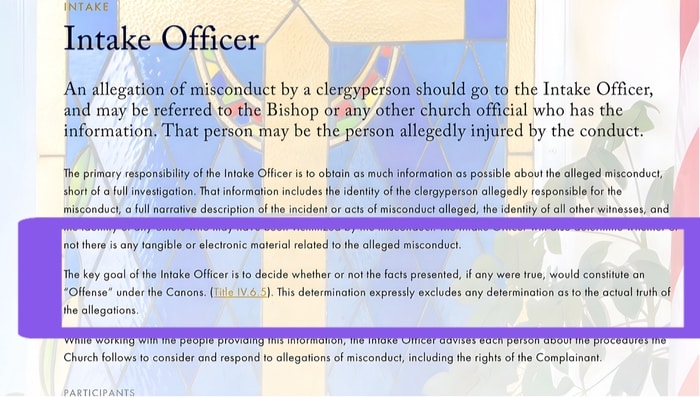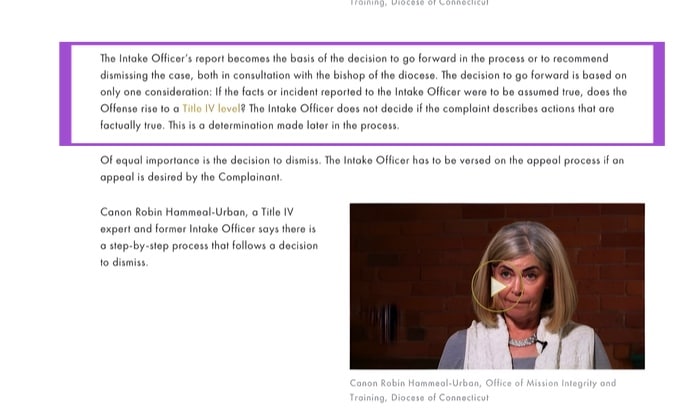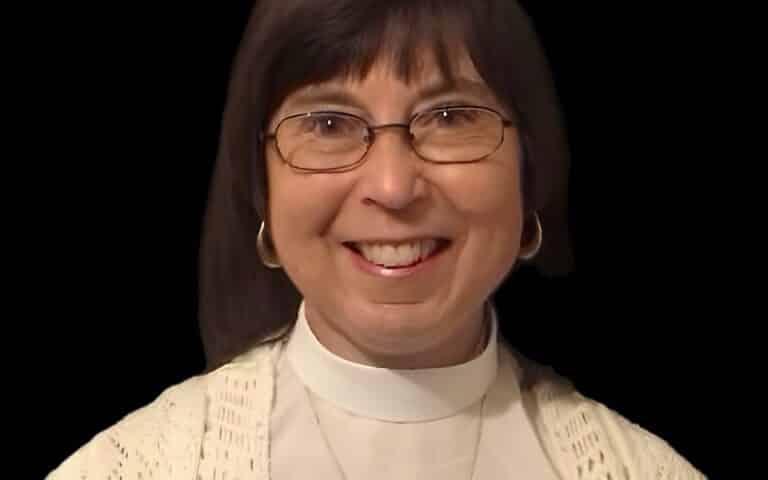Last week, we posted about the situation involving allegations of misconduct by the Rev. Rebecca Roberts, rector of St. Peter’s Episcopal in Cazenovia, New York. Since then, Anglican Watch has received a copy of Title IV intake officer The Rev. Julie E. Calhoun-Bryant’s intake report, which recommends dismissal of the complaint on the basis of a lack of evidence of misconduct.
Here is her report:
There’s a huge problem with that: It is not within Calhoun-Bryant’s authority as an intake officer to make findings of fact or assess evidence.
As a Title IV intake officer, Calhoun-Bryant gets to ask one question, and one question only, under the canons that authorize her work:
Assuming the matters complained of to be true, would they constitute material violations of church canons?
In other words, it doesn’t matter if the allegations seem zany, unsupported by evidence, not consistent with her knowledge of the case, or anything else.
See what the church’s Title IV training materials have to say:
The key goal of the Intake Officer is to decide whether or not the facts presented, if any were true, would constitute an “Offense” under the Canons. (Title IV.6.5). This determination expressly excludes any determination as to the actual truth of the allegations.” (Emphasis added)

an Intake Officer must have a thorough understanding of the entire Title IV structure and process. He or she must know boundaries of duty and how to listen. He or she must know what questions to ask without taking on the tasks that are to be done by an investigator….The Intake Officer’s report becomes the basis of the decision to go forward in the process or to recommend dismissing the case, both in consultation with the bishop of the diocese. The decision to go forward is based on only one consideration: If the facts or incident reported to the Intake Officer were to be assumed true, does the Offense rise to a Title IV level? The Intake Officer does not decide if the complaint describes actions that are factually true.” (Emphasis added.)

Hopefully, Bishop Probe Duncan will act with integrity and tell the intake officer that she too must act with integrity and follow church canons.
So why isn’t intake officer Julie Calhoun-Bryant following Title IV?
To paraphrase Queen Elizabeth I, we have no ability to see through the windows into the souls of intake officers. (And thank heavens for that!)
That said, we’re going to toss out some observations:
- It is almost certainly the case that Calhoun-Bryant doesn’t understand her role under TItle IV. That reflects badly on all involved, including the Bishop Diocesan. There is no excuse for having an intake officer who doesn’t understand their job.
- There’s a lack of ethical awareness on the part of, at a minimum, the intake officer. As an intake officer, you’re dealing with people’s lives, and their faith. Both are priceless parts of being a sentient human being, and it is a privilege and an honor to be in this role. So, we’ll say something we’ve said a million times: Before plunging into a Title IV case, it is essential for all church officials to read Title IV, word for word. Once done, pour a stiff cup ‘o javaswill, and read Title IV again, word, for word. Even if you think you know it by heart, it changes constantly, so don’t assume. And read the damned training materials!
- The church doesn’t recognize that the canons are covenental in nature. Members promise, by virtue of the baptismal covenant and their ongoing gifts to the church, to support the church and its mission. In turn, the church provides rules of the road around which this relationship is structured. Thus, when the church ignores the provisions of its canons, it breaks a promise it has made to its members and the world at large.
- There’s an appallingly common tendency by intake officers to try to substitute their own views in order to spare the church perceived time, trouble, and expense. As one intake officer asked this author, “Why should the church spend thousands of dollars on a Title IV case just because some priest said something you don’t like?” Leaving aside the merits of the case, that is not a question she gets to ask. Similarly, Bishop Todd Ousley, one of the great scumbags of the church (and the guy who trained most bishops on Title IV) loves to insist that he has the authority to ignore the plain language of Title IV in order to provide what he calls a “pastoral solution,” which usually means ignoring the complaint altogether.
- Many intake officers have a bad case of Platonic dualism going. Title IV is not an all-or-nothing proposition. Nor is the goal to beat up the respondent. Rather, the goal is to foster healing and reconciliation. In other words, dismissal should be a very rare outcome — and in most cases, it is not in the church’s best interest.
- When the church fails to police its own behavior, those hurt by the church wind up resorting to the courts. In other words, we have seen many cases in which a thoughtful Title IV response would have solved issues, but the church winds up spending hundreds of thousands of dollars on legal fees simply because it didn’t
- When intake officers are clergy, they often know the respondent. As a result, the whole, “I know her from the annual clergy conference and she’s good people,” thing kicks in. Again, not relevant or proper.
- We must not discount the possibility of corruption. While we try not to go there if we can help it, we have seen far too many cases of egregious and deliberate malfeasance in the church to be able to entirely discount these issues.
So what next?
As we said earlier in this post, our hope is that bishop diocesan acts with integrity by quietly returning the case to the intake officer so that she can follow the provisions of Title IV. It’s also a high priority to get Calhoun-Bryant additional training, including asking her to READ. TITLE. IV. WORD. FOR. WORD. If she won’t do these things, she needs to immediately resign or be removed from office.
All involved also need to recognize that a badly handled Title IV case often causes irreparable harm to the reputations and relationships of all involved. In the words of the Standing Commission on Constitution and Canons:
a poorly handled Title IV matter can cause unnecessary — and often irreparable — harm to both relationships and reputations of all parties involved. The Church has a responsibility to remediate any unnecessary costs, both relational and financial. Consistent and quality upfront training can greatly assist in this regard….More harm to the Church can flow from the mismanagement of a claim than from the misconduct itself.”
In other words, the Diocese is trashing itself via its incompetent and unethical handling of this matter.
Relatedly….
And while the intake officer’s report does not comply with the requirements of Title IV, it does underscore one key point.
Specifically, the report reveals that the letter from the diocesan chancellors is — how to put this gently? — hogwash.
In her efforts to explore what she perceives to be facts — versus the allegations, which is what she is supposed to be examining — the intake officer makes clear that this is NOT a case of stalking or threats.
Indeed, the one conclusion we can reach from this badly done intake report is that the chancellors have, probably in collusion with the respondent, made false and defamatory statements about the complainant. That is problematic as an ethical matter and a legal matter. Not to mention that, legally speaking, there’s no privilege for intra-church statements about a parishioner when made with reckless or knowing disregard for the truth.
In other words, both chancellors should be ashamed of themselves, as well as the Bishop and the standing committee. This sort of behavior has no place in the Body of Christ.
In the meantime, we’re going to send our concerns directly to the intake officer, so she cannot say that she was unaware that she has, herself, violated church canons.
Finally, we caution the Diocese: While we’re trying super hard right now to be fair and even-handed, we’re not going to allow the church to disrespect the dignity of another human being, and we will raise holy hell if it’s needed. We’re resourceful, we’re tenacious, and we do whatever is needed within the bounds of the law to hold you accountable—and that includes Rebecca Roberts.
Follow the canons, treat others with dignity and respect, and work towards health and wholeness.
It’s not too much to ask.
P.S. At some point, we inevitably will hear from some knucklehead who tries to tell us that Title IV is confidential. As to the complainant, it is not, as Title IV, by its express provisions, only applies to clergy. So spare us.


Leave a Reply